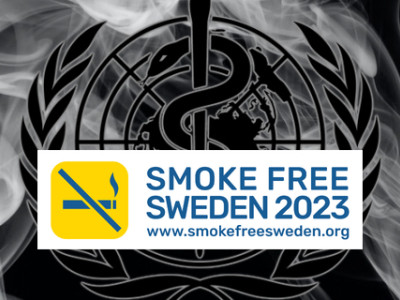Dave Sweanor thanked everybody at KAC Communications for pulling the conference together at short notice, and to all of the presenters who’ve risen to the occasion and would be streamed over the next two days.
Over the last year we’ve seen multiple “nasty” attacks, he said, but this is what we would expect. “Anybody who’s challenged the status quo faces opposition. There’s a lot of people with interests in the status quo…their careers are tied to this.”
Surely it should have been obvious that everybody would want to stop 8 million deaths per year from people sucking smoke into their lungs – a completely hazardous nicotine delivery system? Apparently not, as we have witnessed since Planet of the Vapes was created in 2012.
Clive Bates asked: “What’s gone wrong?”
To address the question, Clive began by stating with what has gone right. The improvements in battery technology allowed electronic cigarettes to be developed, and this presented a product carrying a fraction of the risk of tobacco products: “If everyone got behind it cigarettes would be gone in a generation - But that didn’t happen.”
He said that concerted, pervasive opposition to this innovation came about because it is not part of the playbook of public health. The free market provided solutions to the long-standing tobacco-related disease problem did not including the public health community. Clive continued: “This is antithetical to their modus operandi…it’s counter-cultural, which caused a major backlash.”
In 1997, Clive took over the reins at Action on Smoking and Health (ASH) [link]. “It’s a great time to be coming in. The new Government really wants to do something about the 300 deaths every day from tobacco-related disease. We want to push the tobacco control agenda as far as possible – for the first time in years, real progress looks likely,” he said at the time.
Clive told GFN that he and ASH shared an “overriding concern of people dropping dead or living with real material harm. It affected middle aged adults who had smoked for decades, causing them real harm and misery.”
But there has been a shift in focus for ASH and tobacco control: “The change has been less emphasis on that and focus on nicotine and youth. That has been a big change. It’s a war on drugs and the drug is nicotine, the battleground is nicotine. They never liked nicotine in the first place, but it has come to the fore now people are using it without the harm.”
Time and again tobacco control is having to be reminded that the dose makes the poison, correlation is not causation, mouse studies are not reflective of lived human experience, in-vitro studies do not reflect life, and they are pumping up the fear, linking pseudoscience with press releases to compliant media – and it has “created a situation where science is being used as a weapon. We see highly conflicting studies with scientists finding problems regulators can regulate.”
Tobacco harm reduction sees the worst policies and regulations going, Clive believes. The example he offered up was that of snus; a product that is demonstrably safer than smoking, has a proven record in drastically dropping smoking rates and yet is subjected to “massive regulatory overkill”.
Then there is the World Health Organization, which promotes the idea that less risky products should be regulated as hard as risky ones. “They aren’t looking at the impact of the regulations, which always leads to greater smoking – it is a massive failure of policy making at all levels.”
This is facilitated by the “compliant media” he referred to before: “Coinciding with the rise of ecigs, snus, and heat-not-burn, there has been a structural change in media. Belt tightening and new media has tended to privilege clickbait news. You used to be able to have a normal conversation with science editors, they are now measured by metrics of how many clicks they get. They are compared with all other health correspondents and the views they generate – they love a moral panic and bad news – and bad science that is upstreaming from universities. They should be taking a much harder view on the science surrounding tobacco harm reduction.”
And why? According to Bates, it is to do with “The most addictive, powerful drug of all – money.”
“Here we see wealthy benefactors funding a model of the problem focused on the idea that harm reduction products are from the Big Tobacco, aimed at hooking youth. It’s absolute nonsense, a completely flawed view of the world.” But that money is huge. “It’s propping up the world bank, WHO, a network of activists…and it’s largely unaccountable, unscrutinised.”
Clive thinks advocates, vapers, and experts can do better. “We did very well in stopping medicalisation of ecigs in the EU. I wish we could organise better, form bigger, better networks – but that’s what the Global Forum for Nicotine does for us, all around the world with thousands of people participating.”
Related:
Dave Cross
Journalist at POTVDave is a freelance writer; with articles on music, motorbikes, football, pop-science, vaping and tobacco harm reduction in Sounds, Melody Maker, UBG, AWoL, Bike, When Saturday Comes, Vape News Magazine, and syndicated across the Johnston Press group. He was published in an anthology of “Greatest Football Writing”, but still believes this was a mistake. Dave contributes sketches to comedy shows and used to co-host a radio sketch show. He’s worked with numerous vape companies to develop content for their websites.
Join the discussion
Harm Reduction For The Rich
The United Kingdom risks becoming a harm reduction country only for the wealthy, according to Michael Landl of the World Vapers’ Alliance
CAPHRA Highlights Tobacco Control Flaws
The Coalition of Asia Pacific Tobacco Harm Reduction Advocates highlights the flaws in tobacco control which has led to the rise of black market in Australia
A Missed Opportunity at COP10
The Smoke Free Sweden movement says that COP10 was a missed opportunity to save millions of lives
COP10: Promote Tobacco Harm Reduction
Experts with Smoke Free Sweden are emphasising the urgent need for a Tobacco Harm Reduction approach at COP10












